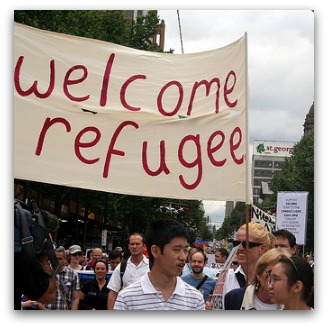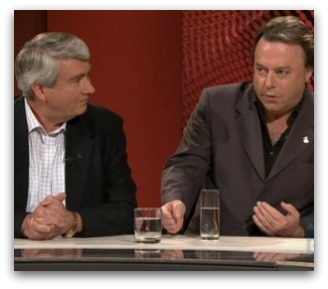Keywords: People Smugglers
-

MEDIA
- Max Atkinson
- 13 October 2011
6 Comments
In supporting her opposition to gay marriage, the best Janet Albrechtsen could say was that the opinion was her own, and was 'fundamental'. These remarks shed light on Albrechtsen's bizarre attack on the judges of the High Court over their decision on the Malaysia solution.
READ MORE
-

RELIGION
- Frank Brennan
- 27 September 2011
28 Comments
Julia Gillard asked her advisers to design a system not for offshore processing but for offshore dumping. If John Howard had tried this in 2001, Labor would have gone ballistic. The advice of Gillard's intermittently trusted advisers is no longer worth the paper it is written on.
READ MORE 
-

AUSTRALIA
- Kerry Murphy
- 13 September 2011
19 Comments
Yesterday the Government announced it will change the Migration Act to enable the Malaysia solution to go ahead. This latest action reinforces rhetoric about queues and people smugglers that obscures the real effects and motivations of current asylum seeker policy.
READ MORE 
-

AUSTRALIA
- Michael Mullins
- 15 August 2011
6 Comments
'Disaster capitalism' entails profiting from the misery of others. Papua New Guinea's motives for agreeing to the reopening of the Manus detention centre are economic. By proceeding with the plan Australia would be complicit in the exploitation of asylum seekers for financial gain.
READ MORE 
-

RELIGION
- Frank Brennan
- 09 August 2011
21 Comments
The Malaysia solution has hit a snag called the High Court of Australia. The Government is now in very stormy waters, because the rule of law and the separation of powers do not readily yield to the sound bites of populist sentiment and the fear tactics of politicians.
READ MORE 
-

RELIGION
- Frank Brennan
- 27 July 2011
30 Comments
The Malaysian solution is unprincipled, but it might just work — stopping the boats. If other countries try to replicate it, we will have to tear up the Refugee Convention and start again. And the plight of unaccompanied minors transported from our shores to Malaysia will be on our conscience.
READ MORE 
-

RELIGION
- Frank Brennan
- 19 July 2011
12 Comments
This is not a regional solution to a regional problem, but a bilateral attempt at solving an Australian problem. To stop the boats, one needs to engage in measures contrary to the Refugee Convention. Church groups can not endorse something they know to be either unworkable or immoral.
READ MORE 
-

RELIGION
- Frank Brennan
- 18 July 2011
5 Comments
When I appeared on Q&A with Christopher Hitchens, a young man asked whether we can 'ever hope to live in a truly secular society' while the religious continue to 'affect political discourse and decision making' on euthanasia, same-sex unions and abortion. Hitchens was simpaticao. I was dumbstruck.
READ MORE
-

AUSTRALIA
- Kerry Murphy
- 23 June 2011
2 Comments
The Rudd Government promised positive reforms after a decade of 'boat people'-bashing from the previous government. Three years later, we are back where we were. To understand how this happened it is helpful to overview the changes under Labor and the gradual decline in 'key immigration values'.
READ MORE
-

AUSTRALIA
- Kerry Murphy
- 06 June 2011
9 Comments
Woomera, 2001. It's late, and we've been working for days. I give the detainees' children highlighters to draw with; unknown to me, one of them draws on the office wall. The next day an officer from the camp accosts me. 'This is damaging government property. Someone will have to pay for it.'
READ MORE 
-

INTERNATIONAL
- Andrew Hamilton
- 12 May 2011
27 Comments
Anne Frank described a refugee as a parcel that is sent from post office to post office. The 'Malaysian solution' is like solving the problem of overloaded post offices by sending incoming parcels straight to the shredder.
READ MORE 
-

INTERNATIONAL
- Andrew Hamilton
- 24 February 2011
33 Comments
Asylum seekers have also always needed help to make their journey to safety. Our people smugglers may be seen as distinctive in that they charge high prices for their troubles. But asylum seekers have always relied on people who exploited them.
READ MORE 